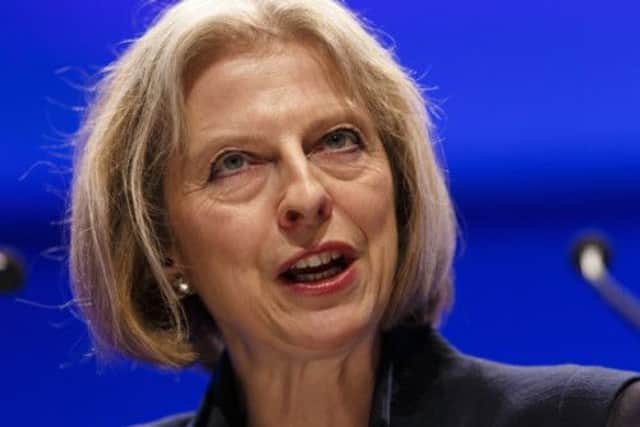Scottish independence: UK passport loss indication


The move, which was made during angry exchanges in the House of Commons yesterday, is at odds with the SNP stance that Scots would automatically be allowed to hold both Scottish and British passports.
Mrs May has previously stated there would have to be passport controls on the Anglo-Scottish Border if a newly independent Scotland joins the European Union and is forced to become part of the Schengen free travel zone, from which the UK is exempt.
Advertisement
Hide AdAdvertisement
Hide AdIn response to a question on passports yesterday from East Kilbride Labour MP Michael McCann, Mrs May said: “Decisions on UK citizenship are for the UK government.”
And the Home Secretary indicated that the foreign policies of a future Scottish government would affect whether Scots could have dual nationality.
She said: “Any decision on retention of UK citizenship by Scottish citizens after independence would be affected by future Scottish government policy decisions.
“To date, the current Scottish Government have not set out what their proposed policies would be in these areas.”
Pete Wishart, SNP MP for Perth and North Perthsire, insisted during the exchanges that Scots would be allowed both passports.
He said: “She will know that, of course, after an independent Scotland it will be possible to keep a UK passport.
“But the real question is why with a new dynamic Scotland in charge of its own resources, making its own peaceful contribution to the world, anyone would want anything other than a Scottish passport in Scotland.”
However, Mrs May made it clear that Scots may have no choice but to give up their British passports.
Advertisement
Hide AdAdvertisement
Hide AdShe said: “As I made clear to the honourable gentlemen who asked the question [Mr McCann], decisions on UK citizenship remain with the UK government, but if the vote in the referendum is for a separatist vote then Scotland will become a separate state – it will not be part of the UK.
“That is a very simple fact and I suggest the honourable member recognise that.”
After the exchanges Mr Wishart said he was “surprised” by Mrs May’s “threat”.
He said: “I don’t know why she went that far and suggested that. I think we all expect dual nationality to be available.”
But Better Together, the cross- party group which is running the campaign against independence, pointed out that Mr Wishart had previously suggested dual nationality might not be necessary.
In a Commons debate in November 2008, Mr Wishart said: “The fact is that since the Scottish Parliament was established, the idea of Britishness has started to wane from the psyche of Scottish people, and as Scotland moves forward to become a normal independent nation, all vestiges of Britishness will go.”
A Better Together spokesperson said: “It is curious that despite once claiming that all vestiges of Britishness will disappear with a Yes vote, Pete Wishart is now desperate to keep his British passport.
“The only way to guarantee we keep our British passports is to vote against separation next year.”
Advertisement
Hide AdAdvertisement
Hide AdA spokesman for Yes Scotland, the umbrella group leading the pro-independence campaign, insisted that dual citizenship would be on the table.
He said: “The Scottish Government’s white paper, due to be published later this year, is expected to include detailed proposals for citizenship on Independence Day.
“Subsequent changes will be for the Scottish people and future Scottish governments to decide. We anticipate an inclusive definition of citizenship, and that dual citizenship would be offered in acknowledgement of the close ties across the UK.”
Previous international precedent on dual nationality following the break up of a state is mixed, but it shows that it depends on decisions of the governments at the time.
After the break up of the Soviet Union in 1991, citizens were forced to choose membership of just one of the new states created.
However, when Ireland gained independence in 1922, its citizens were allowed dual nationality with Britain until 1 January, 1949, when the British Nationality Act came into force.
And the current UK Borders Agency advice states that British subjects who take on another nationality can keep their British passport as long as the second country allows dual nationality.
The row over passports follows another over whether Scots can still describe themselves as British following independence.
Advertisement
Hide AdAdvertisement
Hide AdPro-UK politicians have said that Scots could no longer do so.
However, the SNP has insisted that because Scotland would still be part of the British Isles, Scots could still lay claim to being British.
Tory Chancellor George Osborne has warned that an independent Scotland would not be allowed in a sterling zone formally sharing the currency.
The UK government has also claimed that Scotland’s financial sector will be hit by independence and suggested that major institutions could leave Glasgow, Aberdeen and Edinburgh for the rest of the UK.
The Scottish Government is due to address many of the issues in a white paper expected to be published in the autumn.
SEE ALSO: